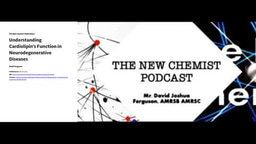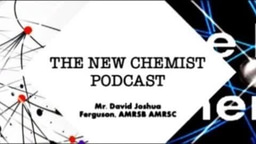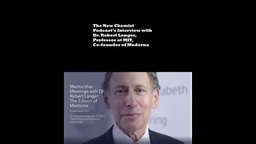An Interview with Dr. Todd Golub , M.D., Chief Scientific Officer,Core Institute Member, Director of ...
Published in Cancer and Biomedical Research
A Conversation to Remember with Dr. Todd Golub, M.D. on "The New Chemist's Podcast"
Interview by David Ferguson, ACS Bridge Fellow and GEM Fellow
Guest: Dr. Todd Golub, MD - Director of The Broad Institute of Harvard University and Massachusetts Institute of Technology
Introduction
David Ferguson: My guest today is Dr. Todd Golub. Thank you for joining me—it's wonderful to have you here. Let me briefly introduce you to our audience.
Dr. Todd Golub is a founding core member of the Broad Institute of Harvard and MIT, where he serves as Chief Scientific Officer and Director of the Cancer Program. He is also Director of the Gerstner Center for Cancer Diagnostics at the Broad Institute.
Dr. Golub joined the faculty at Dana-Farber Cancer Institute and Harvard Medical School in 1997, while simultaneously leading Cancer Genomics at the Whitehead Institute and MIT Center for Genome Research, which later evolved into the Broad Institute's cancer program—a program he has directed since 2004.
Currently, Dr. Golub serves as the Charles A. Dana Investigator in Human Cancer Genetics at Dana-Farber Cancer Institute and as Professor of Pediatrics at Harvard Medical School. His numerous accolades include the Erasmus Hematology Award, the Richard and Hinda Rosenthal Memorial Award, the Outstanding Achievement Award from the American Association for Cancer Research, the Paul Marks Prize for Cancer Research, the E. Mead Johnson Award from the Society for Pediatric Research, and the Judson Daland Prize for Outstanding Achievement in Clinical Investigation from the American Philosophical Society.
Dr. Golub has served on scientific advisory boards for numerous organizations, including as Chair of St. Jude Children's Research Hospital and on the Board of Scientific Advisers of the National Cancer Institute. Please join me in welcoming Dr. Golub.
The Interview
David Ferguson: Dr. Golub, thank you again for being here. Given your remarkable responsibilities and accomplishments at two of the world's leading institutions, I'm eager to explore your journey. My first question is: What have been your longstanding interests in science?
Dr. Todd Golub: First, David, it's wonderful to participate in your podcast. I appreciate what you're doing, and I'm happy to be here.
I've always been fascinated by the interface between medicine and basic science. This intersection becomes increasingly compelling as we discover more opportunities to translate laboratory findings into clinical applications. We're living in an incredibly exciting time where scientific discoveries can have immediate, tangible impacts on patients' lives.
David Ferguson: That's inspiring. Given your many responsibilities, how do you maintain perspective on the bigger picture in your career and life? How do you see the forest for the trees—or, to use a chemistry metaphor, how do you view the entire periodic table while dealing with individual elements? How do you maintain this broader perspective, especially when facing obstacles?
Dr. Todd Golub: Balancing the big picture with focused details is perhaps the most critical—and most challenging—aspect of science. The big picture is essential because you need a clear vision of where you're heading and why it matters. Without this perspective, what's the point of any particular experiment if it doesn't advance you toward a meaningful goal? Whether you're pursuing a concrete objective like finding a cure for cancer—which particularly interests me—or embarking on unfettered discovery to uncover something fundamentally new, that overarching vision is crucial.
How do I maintain this perspective? While I don't have a perfect recipe, I constantly ask myself and my lab members one key question: "Let's imagine your planned experiment succeeds exactly as hoped—will it make a difference? Will people care?"
In my view, the worst possible outcome is an experiment that succeeds in a narrow technical sense but generates no interest or impact in the field. I'd rather strike out on a truly important project with transformative potential than succeed at something inconsequential.
The key is keeping your eye on the larger problem you're trying to solve without becoming too distracted or demoralized by short-term obstacles—which inevitably arise. Remember, the goal isn't merely to overcome immediate challenges; it's to solve bigger questions and persevere through the roadblocks along the way.
David Ferguson: I completely agree. Perseverance is crucial, especially now when people face various challenges—whether in academics with altered class formats or economically with job losses.
Speaking of adaptation, how have you demonstrated creativity in science? Working at such prestigious institutions, what would you identify as the hallmark project showcasing your creativity?
Dr. Todd Golub: I'm delighted you asked about creativity, because it's absolutely central to great science. This often surprises non-scientists, who tend to view science as requiring brilliance or encyclopedic knowledge of facts. They imagine scientists as masters of scientific minutiae. While such knowledge certainly helps, it's far from sufficient.
What truly matters in science is creative thinking—approaching old problems with fresh perspectives, thinking in novel, unconventional ways. This is absolutely critical.
I hold what some might consider an extreme view: scientists should surround themselves with other creative people, including non-scientists and artists. With this philosophy in mind, I helped establish an artist-in-residence program at the Broad Institute. Each year, we invite one or two artists who view the world through their unique creative lens. They spend time at the institute, engaging with scientists, with the hope that their creative approaches will indirectly inspire and benefit our scientific thinking.
David Ferguson: That's remarkable. Given your success in generating ideas and driving research, how do you develop new research concepts? Do you review historical literature for insights, or do ideas come as sudden sparks of innovation?
Dr. Todd Golub: I don't follow a formal process for generating ideas. The path to a great research concept is typically long and challenging, involving the rejection of many ideas that initially seemed promising. Often, these ideas fail under scrutiny—either my own or, more commonly, that of postdocs, students, or other scientists. Upon closer examination, we discover the idea isn't as strong as we thought, or while theoretically sound, it's practically unfeasible.
This can frustrate early-career researchers who expect great project ideas to come easily and quickly. They become discouraged when refining and pressure-testing ideas takes considerable time. However, I believe this time investment is worthwhile. It's far better to thoroughly develop your concept than to rush into executing a half-formed project.
Regarding the balance between past knowledge and future innovation: complete ignorance of previous work risks repeating failed experiments. Conversely, being too constrained by precedent limits your scope to obvious next steps.
My approach typically doesn't begin with literature review. Instead, I start with blue-sky thinking about future possibilities, then work backwards to verify originality. I ask, "This seems like a brilliant idea—has it really never been attempted?" Then I thoroughly search the literature. This sequence—starting with the big idea and then contextualizing it historically—works better for me than trying to construct projects purely from past work.
David Ferguson: Many would argue that Harvard and MIT provide ideal environments for scientific and intellectual growth. How did you find this nurturing environment? Was it serendipity or deliberate pursuit?
Dr. Todd Golub: The question of scientific environment is absolutely critical—perhaps the most important consideration. When lab members prepare to leave for faculty positions or industry roles, they often present spreadsheets comparing salary offers and laboratory space. My response is almost always the same: these factors rarely matter as much as the intellectual environment and the quality of your colleagues and trainees.
With an excellent intellectual environment, whatever resources you have will likely suffice. Conversely, if you're isolated intellectually, no amount of funding or space will compensate for that deficiency.
The ideal research environment features collaborative spirit and a critical mass of scientists exploring related questions from different angles. This creates fertile ground for discovery. Boston's scientific community exemplifies this—the concentration of faculty, students, trainees, and researchers here makes us all better scientists.
How did I end up here? Largely through serendipity, but I've remained because of the richness of scientific discovery, curiosity, and remarkable people in this community.
David Ferguson: Given your numerous responsibilities, how do you maintain work-life balance?
Dr. Todd Golub: I can't claim to have mastered work-life balance. Some people thrive by maintaining a bright line between work and personal life. My mind doesn't operate that way, for better or worse. I view my roles as a person and scientist as a continuum where balance shifts over time—sometimes tilting one direction, then swinging back. This flexibility works for me.
One crucial skill I've developed as a principal investigator—which didn't come naturally—is learning to say no. I now only commit to activities that will genuinely advance my scientific program, support students and trainees, or create positive impact in other meaningful ways. If something doesn't move the needle significantly, I decline. This is easier said than done, but it profoundly affects both sanity and work-life balance.
David Ferguson: That resonates with me. As a graduate student, I'm still navigating balance myself. I agree it's a dynamic process rather than a fixed achievement.
Your profile shows remarkable impact and success as a professor. What would you identify as the key factors or guiding principles behind your success?
Dr. Todd Golub: My approach centers on maintaining focus on truly important problems and being open to tackling them collaboratively. Rather than asking "What can I accomplish alone as a professor or lab head?" I think about collective problem-solving. This mindset enables you to address much more significant challenges when working collaboratively.
If you make meaningful scientific progress this way, your career naturally benefits. It's not self-sacrifice to collaborate and share authorship or leadership on complex projects when the work benefits from joint efforts. There's ample recognition for everyone involved.
My guiding principle is simple: keep your eyes on the goal and do whatever necessary to solve important problems for the field and ultimately for patients. When you follow this approach, everything else falls into place.
David Ferguson: The Broad Institute clearly emphasizes collaboration, including your Artists in Residence Program that brings in non-scientists. How do you foster vision and teamwork in your environment?
Dr. Todd Golub: The key to effective teamwork is having goals that genuinely excite everyone—creating a sense of common cause. Team members need to feel they're tackling important problems they couldn't solve alone but can address collectively.
If your problem isn't truly important, why endure the complexities of collaborative, team-based science? Working within your own group is far simpler. However, once you recognize that collaboration enables far greater impact, the synergistic approach becomes logical. You'll gladly navigate occasional complications—like more complex decision-making with multiple leaders—because it's the price of pursuing world-changing projects. That's a trade-off I'm always willing to make.
This returns us to our starting point: ensuring you're working on the right problems is crucial. If you're organizing complex collaborations for inconsequential goals, why bother?
Some people fantasize that simply placing people from different disciplines in the same building or around the same coffee machine will spontaneously generate multidisciplinary breakthroughs. I don't believe this happens often. Instead, successful collaboration requires people aligned in their desire to solve a specific problem, sharing the conviction that they should employ whatever disciplines and expertise necessary. When everyone rows in the same direction toward a common goal, you're positioned for truly multidisciplinary discoveries.
David Ferguson: Shifting gears, why did you choose medicine for your doctoral studies? What drew you to medical school?
Dr. Todd Golub: Like many college graduates, I agonized over whether to pursue graduate school, medical school, or an MD/PhD program. Ultimately, I chose medical school while incorporating as much laboratory research as possible during my studies.
I made this choice because medical problems genuinely intrigued me. I was motivated by the desire to help patients and fascinated by the scientific challenges within medicine. To address these challenges effectively, I felt I needed to truly understand the nature of the problems.
Though I no longer see patients clinically, I'm grateful for my medical training. It helps me identify problems genuinely needing solutions and understand what's feasible in healthcare settings, which is incredibly rewarding.
Not pursuing a PhD did create some gaps in my fundamental knowledge base—arguably a handicap in certain ways. However, sometimes the focused training of a PhD can create tunnel vision, overly narrowing one's perspective. My potentially naive view of science has certain advantages—I've maintained an open mind to possibilities, unconstrained by predetermined paths.
David Ferguson: Many people face this challenging choice between grad school, med school, and MD/PhD programs. For your residency, why did you choose pediatrics over internal medicine, oncology, or radiation oncology?
Dr. Todd Golub: Honestly, I found pediatricians to be genuinely nice people. As we've discussed, your environment significantly impacts your work experience. I enjoyed being surrounded by pediatricians—they struck me as genuine, kind individuals who, compared to some other medical specialties, tend to have less ego. This appealed to me greatly.
Of course, I also loved interacting with children and young families. I found deep satisfaction in helping young parents navigate extremely difficult emotional challenges, beyond just the medical and scientific aspects.
I subspecialized in pediatric oncology. When young parents learn their child has cancer, it's arguably the worst news they can imagine. Breaking this news was incredibly difficult and unpleasant. Yet paradoxically, it brought me profound satisfaction as a physician. If you can guide a family through their darkest period, help them glimpse hope, explain complex information clearly, and provide realistic optimism without false promises, you've done something deeply meaningful. That brought me tremendous fulfillment.
Ironically, I miss that aspect of delivering difficult news, because doing it well can profoundly help patients and families, while doing it poorly is devastating. It was a skill I valued developing.
David Ferguson: My father is a pediatrician who shares similar sentiments. He particularly appreciates children's remarkable resilience when facing disease and other challenges.
Dr. Todd Golub: Children are indeed amazing—both in their emotional strength and what they unfortunately sometimes must endure. Medically, they're incredibly resilient, and their bodies show remarkable adaptability. There's fascinating science there as well.
David Ferguson: As we conclude, what advice would you offer to those pursuing careers in your field—whether scientists facing COVID-era challenges or undergraduates aspiring to similar professions?
Dr. Todd Golub: My key advice is to always consider impact. Ask yourself: "How can I maximize my positive impact on my field and the world?" Then do whatever necessary to achieve that impact.
If you're heading down a scientific path where even short-term success yields minimal impact, that's problematic. It's worth stepping back to ask what different direction might offer greater potential impact. You can't guarantee major breakthroughs—if you want guarantees, you won't achieve significant impact. Guaranteed successes yield only incremental advances, not the dramatic impact we all hope to achieve.
This means embracing some risk, which I believe is both acceptable and necessary. Just ensure the potential for meaningful impact exists. If it doesn't, you should apply your talent, brilliance, creativity, motivation, and hard work to something more important.
David Ferguson: I couldn't agree more. Dr. Golub, thank you so much for joining me today. It's been wonderful having you on the podcast.
Original recording conducted in 2020 on "The New Chemist's Podcast"
Published on March 14, 2023
DOI: 10.21428/3ed95e66.a118ec5a





Please sign in or register for FREE
If you are a registered user on Research Communities by Springer Nature, please sign in